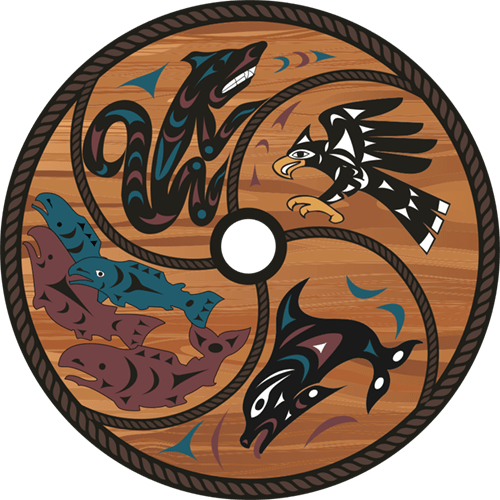W̱SÁNEĆ Leadership Forum: W̱SÁNEĆ Coming Together
On April 11, 2024, leadership and Elders from the W̱SÁNEĆ communities gathered for a Leadership Forum (the Forum) to view presentations on strategic ways of working together to ensure a bright and prosperous future for the W̱SÁNEĆ community. The theme of the forum was “Planning for the Future of W̱SÁNEĆ,” and leadership from four W̱SÁNEĆ bands attended.

The Forum – which provided a venue for presentations and conversations about nationhood, self-determination, and the reclamation of Indigenous rights and authorities – is a timely opportunity for the W̱SÁNEĆ to further the goals of working together.

W̱SÁNEĆ is currently bearing the burden of nearly two centuries of oppressive colonial policies that have had negative impacts on W̱SÁNEĆ territory and access to it. WLC recently established a Vision that imagines the community moving into meaningful action, spurring a movement away from oppressive colonial policies and towards a future in which the W̱SÁNEĆ experience quality of life similar to that which existed before settler control.
Specifically, the Vision calls for W̱SÁNEĆ to work together to establish land back initiatives, regaining a role in resource management, access, cultivating a new fiscal relationship, implementing W̱SÁNEĆ laws, realizing true economic inclusion, and ultimately removing oppressive policies and replacing it with authorities of the W̱SÁNEĆ Nation.
The Forum provided presentations and discussions that furthered these ends and encouraged collaborations. Overarching themes discussed included the preservation and revitalization of traditional cultural practices, the creation of cultural spaces for W̱SÁNEĆ people to access, and the improvement of food sovereignty.
The morning sessions began with an opening song and prayer. Then, the day continued with five impactful presentations presented by speakers from both the public and private sectors.
The first presenter was Jean-Pierre Morin, Departmental Historian for the Crown-Indigenous Relations and Northern Affairs Canada (CIRNAC). His presentation, titled “Reserves of the Saanich Peninsula,” discussed the long-term impacts of the Indian Act and the reserve creation process on the W̱SÁNEĆ people.
Two representatives from Woodward & Company Lawyers, LLP—Eamon Murphy (Partner) and Stephanie Axmann (Senior Counsel)—presented the “Collaborative Pursuit of Rights Recognition and Implementation.” Woodward & Co. Lawyers LLP is a law firm that works exclusively with Indigenous governments and organizations. Their mission is to be the leading national law firm that provides excellent legal services to Indigenous communities, governments and businesses, advancing transformative change in an era of reconciliation and decolonization.
In their presentation, Murphy and Axmann discussed two specific legal cases: the Ahousaht (& Nuu-Chah-Nulth) fishing rights cases and the Tsilhqot’in Aboriginal title claim, to demonstrate the power of the collective both in legislation and negotiation.
Kilslaay Kaajii Sding Miles Richardson, of the Eagle Clan of Ts’aahl (Haida Nation) presented on “Reconciling Ways of Knowing Nationhood Support Initiative.” He is the Chair and Director of the National Consortium for Indigenous Economic Development (NCIED) at the University of Victoria. NCIED is a sponsor of Nationhood Supportive Initiative, a movement working to assert Indigenous Nationhood through stewardship throughout Canada.
Corey Dekker—Director of Vancouver Island Negotiations for CIRNAC—and Christie Harvie—Regional Executive Director, Coast Area for the Ministry of Indigenous Relations and Reconciliation—delivered a presentation which discussed the lasting effects of colonialism on W̱SÁNEĆ peoples, especially when it comes to the legacies of the Indian Act. Their presentation covered issues about self-determination, the benefits of collectivity, and ways to move forward to (re)build nationhood.
Joni Olsen, Policy Negotiations Manager for the W̱SÁNEĆ Leadership Council (WLC) presented “Douglas Treaty Implementation,” where she discussed direct impacts of colonization on W̱SÁNEĆ communities. Specifically, things like land loss as a result of Indian Act divisions. She also discussed the next steps for land acquisition strategies and emphasized the differences between pre-Colonial sovereignty and contemporary regulation.
The day’s presentations were video recorded and are now available to the W̱SÁNEĆ community on the community members-only login section of the WLC website. For access, please text ACCESS to (778) 909-1895, then your First & Last Name and W̱SÁNEĆ Band Affiliation.
To stay up to date on this story and others, sign up for the WLC newsletter below.






